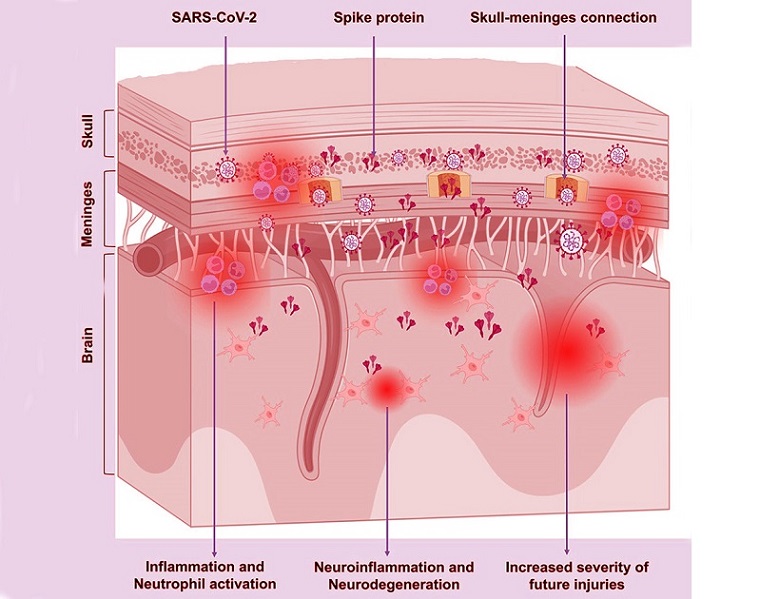Persistence of SARS-CoV-2 Spike Protein Found at the Skull-Meninges-Brain Axis Even After ‘Recovery’!
Nikhil Prasad Fact checked by:Thailand Medical News Team Dec 01, 2024 1 year, 2 weeks, 1 hour, 25 minutes ago
Medical News: Groundbreaking Research on the Long-Term Neurological Impact of COVID-19
The lingering effects of COVID-19 continue to puzzle researchers and clinicians alike. A new study led by scientists from Helmholtz Munich-Germany, Ludwig-Maximilians-University Munich-Germany, Sun Yat-Sen University in China, and Yale School of Medicine-USA reveals a critical discovery: the spike protein of SARS-CoV-2, the virus responsible for COVID-19, can persist in the skull-meninges-brain axis long after the virus itself has cleared from the body. This region, which includes the bone marrow of the skull, the meninges (protective membranes of the brain), and the brain itself, may hold the key to understanding the neurological complications associated with long COVID.
 Graphical Abstract:Persistence of SARS-CoV-2 Spike Protein Found at the Skull-Meninges-Brain Axis Even After ‘Recovery’
Graphical Abstract:Persistence of SARS-CoV-2 Spike Protein Found at the Skull-Meninges-Brain Axis Even After ‘Recovery’
This research sheds light on how residual viral proteins could contribute to long-term inflammation, neurodegeneration, and vulnerability to further neurological damage. Through sophisticated techniques and extensive analysis, the study bridges the gap between observed long COVID symptoms and the biological changes occurring in the brain.
The Study’s Scope and Methods
To investigate the persistence of SARS-CoV-2 proteins in the human body, researchers used advanced optical clearing and imaging techniques. Post-mortem samples from COVID-19 patients and individuals who had recovered from the virus but later died of unrelated causes were analyzed. The findings were striking: SARS-CoV-2 spike protein was detected in the skull marrow, meninges, and even in neurons of the brain, despite the absence of active viral RNA.
Parallel studies on mice further demonstrated the spike protein’s capacity to travel from the skull bone marrow to the brain, triggering inflammation and neurodegeneration. Researchers also conducted proteomic analysis - an examination of proteins and their interactions - to uncover the molecular changes in tissues affected by the spike protein. This
Medical News report will delve deeper into these findings and their implications for long COVID patients.
Key Findings
-Spike Protein Persistence in Brain Regions:
Using post-mortem samples, researchers identified the spike protein in critical areas of the skull-meninges-brain axis. Intriguingly, while active viral RNA was absent, indicating no ongoing infection, the spike protein itself lingered. This suggests that the spike protein may have a longer half-life or specific mechanisms allowing it to remain in tissues.
-Neuroinflammation and Neuronal Damage in Mice:
In mouse models, direct injection of the spike protein into the skull marrow induced a cascade of pathological effects. Within 30 minutes, the protein traveled to the brain, where it triggered inflammation and increased levels of cleaved caspase-3, a marker of cell death. Behavioral tests revealed anxiety-like sympt
oms in the mice, highlighting the spike protein's capacity to affect neurological function independently of the virus.
-Proteomic Changes and Neurodegeneration Markers:
Proteomic analysis of human and mouse tissues exposed to the spike protein showed significant dysregulation of inflammatory pathways, including those linked to neurodegeneration. In long COVID patients, cerebrospinal fluid (CSF) samples revealed elevated levels of Tau and neurofilament light chain (NfL), biomarkers of neurodegeneration, further supporting the connection between the spike protein and long-term brain damage.
-Amplification of Neurological Damage Post-Injury:
The study also explored how the spike protein affects the brain's response to injury. In mouse models of stroke and traumatic brain injury (TBI), the presence of the spike protein exacerbated the extent of neuronal damage, inflammation, and brain atrophy. This suggests that residual spike protein may make the brain more vulnerable to subsequent injuries or diseases.
Implications for Long COVID
The persistence of the spike protein in the skull-meninges-brain axis provides a potential explanation for the neurological symptoms commonly reported in long COVID patients, such as brain fog, memory impairment, anxiety, and mood disturbances. These findings suggest that even after the acute phase of COVID-19 has passed, residual viral components can continue to disrupt normal brain function, leading to prolonged symptoms.
This research also emphasizes the importance of developing diagnostic and therapeutic tools targeting the lingering effects of the spike protein. Blood and CSF tests for specific protein markers may help identify patients at risk of long-term neurological complications, enabling early intervention.
Conclusions
This comprehensive study uncovers a critical link between the persistence of SARS-CoV-2 spike protein and the neurological symptoms observed in long COVID. Key takeaways from the research include:
-The spike protein can persist in the skull-meninges-brain axis, even after the virus is no longer detectable in the body, contributing to inflammation, neurodegeneration, and heightened vulnerability to further brain injury.
-Proteomic analysis reveals significant changes in proteins involved in immune response, inflammation, and neurodegenerative pathways in tissues exposed to the spike protein.
These findings highlight the need for targeted therapies to address the residual effects of the spike protein, particularly in long COVID patients experiencing neurological symptoms.
The implications of this research extend beyond COVID-19, offering insights into how viral proteins can have lasting impacts on brain health. By identifying the mechanisms underlying these effects, this study paves the way for new approaches to diagnosing and treating the neurological sequelae of viral infections.
The study findings were published in the peer-reviewed journal: Cell Host & Microbe.
https://www.sciencedirect.com/science/article/pii/S1931312824004384
For the latest COVID-19 News, keep on logging to Thailand
Medical News.
Read Also:
https://www.thailandmedical.news/news/sars-cov-2-infects-ipsc-derived-neurons-and-causes-brain-degeneration-with-cathepsin-b-playing-a-crucial-role-in-viral-entry
https://www.thailandmedical.news/news/neurotrophins-role-in-covid-19-brain-impact-and-recovery
https://www.thailandmedical.news/news/romanian-study-warns-that-covid-19-increases-risk-of-brain-bleeding
(Refer to TMN website as there are more than 128 articles on how SARS-CoV-2 affects the human brains.)
Follow us on:
https://x.com/ThailandMedicaX
https://bsky.app/profile/thailandmedical.bsky.social
https://gettr.com/user/thailandmedicalnews
https://www.facebook.com/ThailandMedicalNews
